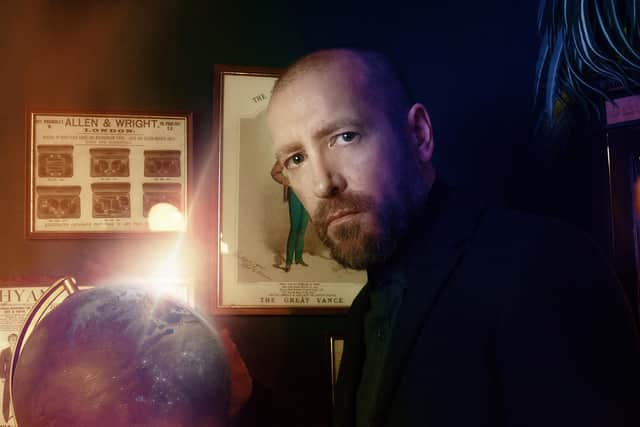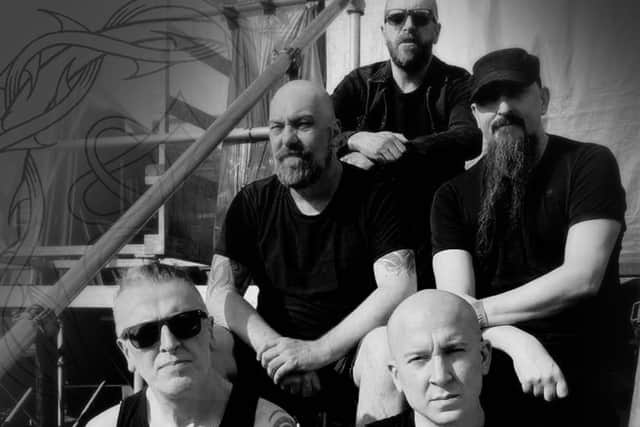Paradise Lost: 'We couldn’t play with mainstream metal bands because it was too extreme for them'


Vocalist Nick Holmes reckons it’s more than 20 years since the five-piece, who formed in Halifax, last played at St George’s Hall in Bradford. Next month they are due to make a tumultuous return. “It should be good,” he says. “We haven’t played Bradford St George’s Hall since 2001 or something. It’s a long time since we played there.”
When the group formed in 1988, there was only a limited audience for their brand of extremely heavy metal. “There was a scene for the more extreme bands, but it was very small,” recalls Holmes, now 52. “There was maybe a handful of people in each town, so you’d have 15 people in Halifax maybe, 20 people in Bradford and 25 in Leeds, and they’d come together at The 1 in 12 Club (in Bradford) or the Adam and Eve Club in Leeds.”
Advertisement
Hide AdAdvertisement
Hide AdHe remembers a “crossover” between the extreme ends of punk and metal, adding: “There was a club called the Planet X is Liverpool which we used to frequent quite a lot, in our early shows we used to play there very often – and that was again, a bit like a 1 in 12-type punk club in the centre of Liverpool.”
Because the scene was so small, “everyone kind of knew each other”, he says, and bands relied on word-of-mouth. “A lot of these bands weren’t even on vinyl; a lot of it was cassettes or word of mouth. Tape trading was a big thing in the 80s, which we all loved doing, and then it got onto vinyl and major labels picked it up and it snowballed and got bigger and everyone got to know the more established death metal bands.
“But it was a great scene. Most of our fondest memories are from 16 to 23 – but I would imagine most people’s fondest memories are from that kind of age, generally speaking. When we started we couldn’t really play with more mainstream metal bands because it was too extreme for them, so it kind of crossed over and fused together.”
Paradise Lost would go on to sell more than two million albums, but they reached their commercial peak in 1995 with the album Draconian Times. Holmes is relaxed about the fact that it’s the record that the remainder of their catalogue is judged against. “It’s fine,” he says. “We were really in the right place at the right time with that album. The production and the songs were very upbeat, they were splashy, uptempo songs, and the metal bands that were around at that time they were like that – bands like Queensrÿche and The Cult, when The Cult became more of an arena band on the Sonic Temple album that was the kind of songs they were doing. We were going for that vibe but within our way of doing it.
Advertisement
Hide AdAdvertisement
Hide Ad“Every album is like a bookmark of what was going on then. What we’re into at the time of doing it, that’s that, and once you’ve recorded it there’s no point in regretting it because you’ve done it… Sometimes you do an album that you think is amazing but it doesn’t take off how you thought, and next time it might do or it might not. You’ve just got to play what you think is your A-game every time and hopefully people join in.”


Diversions into Depeche Mode-like electronica on their late 1990s albums One Second and Host wrongfooted some of their original audience, but they were amongst their bestsellers in Germany, Sweden and Finland. Holmes says by that point they’d tired of “doing a similar sort of thing” on back-to-back world tours for their goth metal records Icon and Draconian Times, adding: “We thought let’s just put the brakes on and try something a bit different – that’s when we did the One Second album, which threw a lot of people, and the one after it ever more so. In hindsight, I’d have maybe released them as a side project.”
More recent records have returned to their heavy guitar sound. This year Guido Montanarini joined them on drums to replace Waltteri Väyrynen, who joined Opeth. To mark the 30th anniversary of Icon, the band have re-recorded the album. “A lot of the early albums we don’t own the right to,” Holmes explains. “We can’t re-release them, and it’s the same with the artwork, we can’t do that either. So it was a combination of that and because it was the 30th anniversary we thought we’ll revisit it, and 30 years later re-recording it it’s a fair old chunk of time, so we thought it would be interesting to see what it would be like done now.”
He notes that it’s becoming a more common means for pop artists such as Taylor Swift to reassert control over their catalogue. As far as Paradise Lost were concerned, he says: “We wanted to be as faithful to the original album as possible, but there again, we are completely aware that if you grew up listening to something, it’s going to be hard-coded to sound a certain way. You’re never going to get anyone to say it’s going to be better than the original if they grew up listening to that. I’m sure Metallica could have a good crack at doing Masters of the Puppets again but it’s never going to be as good as the original for me. So it’s not about that for me, it’s just a fresher version of it and making it sound like a modern production. Icon sounds good to me for 1993, but this has got a more modern, fresher feel to it, I think.”
Icon 30 is out on December 1. Paradise Lost play at St George’s Hall, Bradford on December 14. https://www.paradiselost.co.uk/
